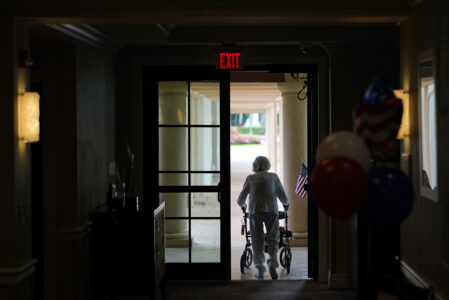If Blue Cross Blue Shield doesn’t pay more, LMH may ask state employees to consider a different insurance provider

photo by: Chris Conde
Lawrence Memorial Hospital, October 2018.
Leaders at LMH Health are convinced the state’s largest health insurance company pays LMH less for medical care than hospitals in places like Topeka receive for providing the same type of care.
LMH leaders said this past week that they’ve launched new negotiations with Blue Cross Blue Shield of Kansas to correct the financial discrepancy. And some hospital officials indicated they were willing to get aggressive on the issue, potentially inserting University of Kansas and other state employees into the fight.
“We know we need to find a solution to this,” Russ Johnson, president and CEO of LMH Health, told the hospital’s board of trustees this past week.
That’s in part because Topeka-based Blue Cross Blue Shield of Kansas is the largest private insurance company that LMH does business with in the course of a year. In other words, Blue Cross Blue Shield has lots of customers who end up patients at LMH.
Many of those customers are employees of the state of Kansas, as BCBS of Kansas is one of two health insurance options for most state employees, which include the thousands of workers at KU.
That fact had LMH trustee and former state legislator Tom Sloan wondering whether LMH should start a campaign to educate state employees on how LMH is treated differently than some other hospitals in the area. Sloan said he thinks state employees who live in Lawrence would appreciate the information because they would understand that how BCBS reimburses LMH for care ultimately will help determine what types of services LMH can provide the community in the future.
“I’m really troubled by the fact that other area hospitals receive higher reimbursements than LMH,” Sloan said at Wednesday’s monthly meeting of the LMH Board of Trustees.
LMH did not provide specific examples of the purported differences in payment that BCBS provides to LMH versus other hospitals. A spokeswoman for BCBS of Kansas also did not specifically address the issue when contacted by the Journal-World, but did offer a general statement.
“BCBSKS and LMH have an agreement that allows our members in their service area to receive affordable, high-quality care through competitive reimbursement,” Katrina McGivern, corporate communications manager for BCBS of Kansas, said via email. “LMH, and all of our in-network hospitals, have the opportunity to receive additional reimbursement if they meet certain quality and efficiency goals for their patients.”
At Wednesday’s meeting, Johnson said it wasn’t the right time for LMH to begin an effort to convince state employees to shift their insurance to the state’s other provider, Aetna.
“Let’s stay tuned,” Johnson said.
Johnson said he still believes LMH and BCBS of Kansas can reach a good multiyear deal. The two organizations are talking about a three-year deal, instead of the normal one-year deal that has been used in the past, Johnson said.
“We are in good conversations now,” Johnson said. “But there is a difference between how we are seen as a hospital and what we are paid, and how others around us are paid.”
Other hospital trustees, however, said they wanted to make sure the idea of reaching out to state employees about their insurance choices isn’t forgotten. Trustee Larry McElwain said he wanted to bring the idea back up in the middle of this year if negotiations haven’t been fruitful. State employees generally will have the opportunity to switch insurance providers in the fall.
“It is disappointing to hear that we are still being perceived one way that is not correct,” McElwain said.
Dr. Shari Matejka Quick, who also is an LMH trustee, said she had worked with BCBS of Kansas as a physician for years, and found the company to be a respected provider of health insurance. But she said it might be time for LMH to remind BCBS that many people rely greatly on LMH for their health care and that the nonprofit hospital plays a critical role as a safety net health care provider in Lawrence.
“They (BCBS) need to be aware that the community receives quality care through LMH Health, and the community wants to continue to receive that care through LMH Health,” Quick said.
This isn’t the first time that issues between LMH and the state’s largest health insurance provider have emerged publicly. In November, Johnson took the unusual step of alerting the hospital’s board of trustees that contract negotiations with BCBS of Kansas were not going well.
Johnson warned the board that a one-year contract for 2021 had not been signed, and that LMH executives feared BCBS of Kansas wanted to revert back to a payment structure that was similar to what the hospital was receiving for services in 2014.
At that time, BCBS of Kansas did express some concern with the pricing structure LMH uses for some of its services.
“It is our responsibility to ensure our members and groups get high-quality health care at an affordable price,” McGivern said in November. “We support LMH’s mission to provide care to its patients, but it has to be delivered at a price the people of Douglas County can afford.”
LMH officials pushed back on price concerns, saying they had data that showed LMH compared favorably with many national averages. In theory, the issue of pricing difference should be easier to figure out now. Since November, new federal regulations require hospitals to list certain pricing data on their websites. But Deb Cartwright, chief financial officer for LMH, told board members that many hospitals in the state haven’t yet complied with that new requirement. LMH has listed pricing data, but Cartwright said LMH was not finding similar data on several other hospital websites, saying there was a “pervasiveness” of noncompliance across the state.
Ultimately, LMH and BCBS of Kansas reached an agreement late last year for 2021. Johnson said it was a fair agreement and estimated it saved LMH about $2 million in payments that it might have lost otherwise.
But at Wednesday’s board meeting, he said he was getting “early signals” that the new round of negotiations with BCBS of Kansas would be challenging.
“Their early signals are they continue to assert that they need to move us down in payment,” Johnson said.
He later clarified that BCBS of Kansas is not simply discussing slowing the rate at which payments to LMH increase but rather is discussing “lower payments.” Johnson said that puts LMH in a difficult position because none of its major expense categories is seeing a decline.
Johnson said it is becoming clear the two sides are not seeing the same picture of LMH and the Lawrence community.
“I think there is a sensibility that we sort of are a high-cost hospital, and our data just doesn’t bear that out,” Johnson said. “But we want to understand why we are seen as different.”
The stakes are relatively high for both groups to get on the same page. Presumably, BCBS of Kansas finds Douglas County — one of only a few urban counties in the state — an important market, especially since it is home to so many state employees.
But it also would be hard to overstate how important BCBS of Kansas is to LMH’s financial health. In November LMH revealed that it receives about half of all its commercial — nongovernment — revenues from BCBS of Kansas payments.
That could make future negotiations not only challenging, but delicate. On Wednesday, Johnson stressed that the hospital still had strong respect for BCBS of Kansas.
“We are not trying to say they are the evil side of health care,” Johnson said. “That is not it at all. We think there are just some misunderstandings.”






